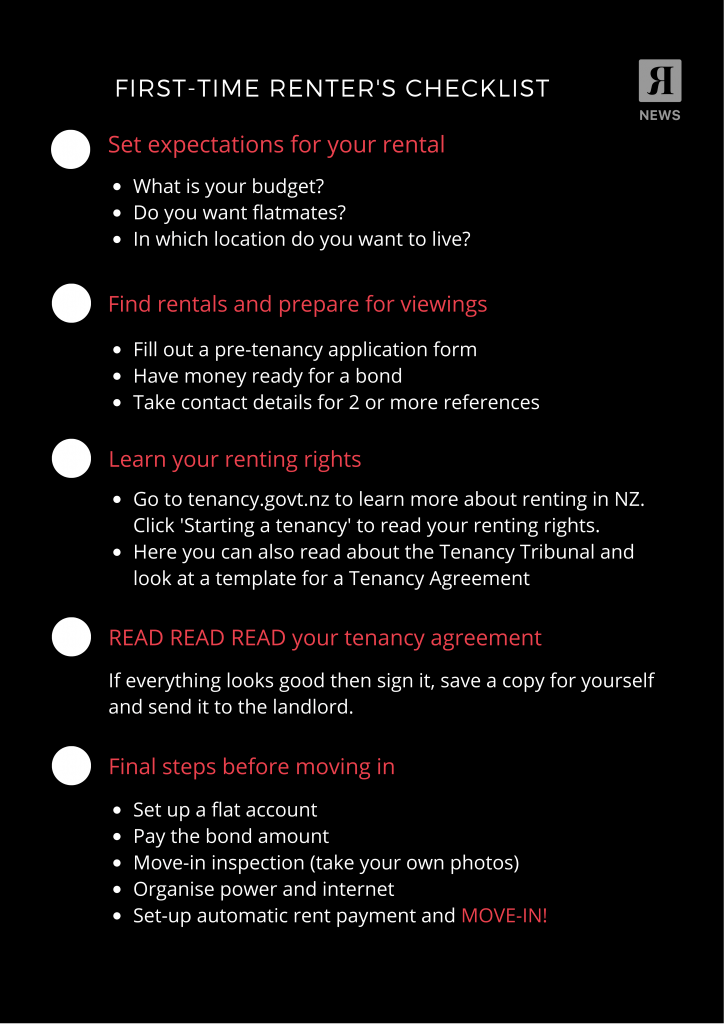The latest news for New Zealand Landlords and Tenants
First-time renter’s checklist
Being a first-time renter is exciting but there’s also a lot to know before you move-in to your first home. Use this checklist to make everything easier when renting in NZ.
If this is your first renting experience, it’s easy to become overwhelmed with the whole process. There’s a lot to consider, a lot to remember, and a whole lot of stress can be the result.
With a bit of guidance, this doesn’t have to be the case.
Here are a few simple things you should keep in mind as a first-time renter, in order to:
- find the right rental
- understand your rights and responsibilities and
- have a great renting experience
We divide this article into three stages before giving you a final checklist at the end. Please feel free to scroll straight to the bottom if you aren’t interested in the explanation of each stage and would only like a concise checklist. If you really are a first time renter though we advise reading through everything.
For more information on renting in New Zealand, please see: TenancyServices
Stage 1: Finding your rental
Know what you can afford
It’s a good idea to take your average weekly income and work out what you can afford to spend on rent. Many experts advise spending no more than 30% of your income on rent. Unfortunately, if you’re a student or someone on a low income, this isn’t always possible.
While there are different ways to decide how much you are able to spend on rent, it is wise to establish how much you need for food and utilities, as well as savings. Once you work this out you can see how much of your income can be spent on rent. Remember to also put some money aside for the bond and some rent upfront. For more information on what a bond is and how much they usually are, see:
To flatmate or not to flatmate?
Sharing the cost of rent and utilities is a great way to save money as a first-time renter. It is also likely to make your first renting experience a lot more fun – even if your milk keeps mysteriously disappearing. If you decide you want to flat with other people, you need to decide if you want to:
- join a group of friends or
- join an established flat
Although you may not want to live with people that you are unfamiliar with, there are pros and cons to both situations. Living with an established flat means everything will already have a system and you (most likely) won’t need to organise internet, power, etc.
If you decide to live with friends it is important to choose ones that you can tolerate for long periods of time. It sounds rough but just because you are great friends with someone, it does not necessarily mean you will be great living together. A lot of the time these situations are trial and error but, who knows? Your first flat might be the best flat!
Prepare to compromise
You’ve likely got an image of the perfect flat in your head and although it might seem like you’ll find it the first time around, the rental market is competitive. Landing your first flat can be difficult, especially if you’re looking in places with high-demand such as Wellington or Auckland. Why? Well, many landlords favour those applicants who have had more renting experience. This is because there are less risks with renters who have flatted before and often, they can provide a reference of a previous landlord who can vouch for them.
So when searching for your first flat – be prepared to compromise.
Know what you need in a property and what you’re prepared to compromise on. Maybe you refuse to live somewhere that doesn’t have more than one toilet, but you’re willing to organise your own washing machine and dryer. In any case, if you’re willing to adjust expectations you will find a property faster.
Having the ability to compromise is a huge lesson of flatting. Not only is this something that is important in the house hunting stage but also when you’re living with other people. Making group decisions and living peacefully with other flatties comes easier when you can do this.
Make yourself more favourable as a first-time renter
Even though you should be prepared to compromise, there are also some things you can and should do to make yourself more favourable as a first-time renter.
Go to the viewing prepared with:
-
A pre-tenancy application
This is the very first document you give to a landlord to apply for their property. Have one ready with all of the relevant details and hand this to the landlord at the viewing if you are interested. This pre-tenancy application by TenantCheck is a great document to use as it complies with all new renting and privacy laws. It also includes a checklist of things to prepare for your viewing. Click here to download this.
-
References
Even if you’re a first-time renter with no renting experience, it’s a good idea to have references handy who can vouch for your good character. Think about long-term employees, family friends, and other people who have known you for a decent length of time. You can attach written references to your pre-tenancy application but always include a number or email that the landlord can use to contact them.
-
Show up on time and show interest
Finding a rental is competitive so you want to make sure that you show up on time and show that you’re interested. If you are late and the viewing is busy, the landlord may have already found someone suitable. Being punctual is also good in showing that you won’t be late for rent payments or inspections which both require this.
You also want to make sure the landlord knows who you are and that you are interested. If you have to stick around for a conversation, do this. A huge mistake people make is assuming a landlord will choose them purely because their pre-tenancy application looks good but there is a lot of value in talking to them and making sure they know you are interested. Here are some questions you can ask if you’re unsure what to talk about. These questions to ask at a flat viewing are also very useful in helping you with your decision.
-
Have a bond ready
Most rental properties will require a bond deposit before you move-in. This can be up to four weeks rent and you will get this back once your tenancy ends if the house is kept in great condition. If you do not have the money for a bond then this could make or break the landlord’s decision. Be sure to have some money stored away to pay for this so the landlord knows you are prepared. Make sure you stay informed on what a bond is, and collecting and lodging a bond – this is vital information for a first time renter!
Know where to look
There is a huge range of places to find potential rentals. Some include:
- Trade Me Property
- Realestate.co.nz
- Homes.co.nz
- the Facebook marketplace, and also
- real estate companies in your area
Although all of these sources should show results, it is wise to be cautious about some of the advertisements. Somewhere like the Facebook marketplace might have heaps of rentals and rooms listed but it does not have buyer protection. This is different from Trade Me which does offer buyer protection and is New Zealand’s number one real estate website. Trade Me also requires people to pay to list their property so more often than not, these people are serious about having their home rented.
Decide on location
Unless you work from home, you’re likely going to need to live in a specific area to stay close to your job or schooling. Since location is a big part of any property, it’s worth having a look at where you want to be living before you start attending viewings. Take into consideration:
- whether you can afford to commute
- if you want to be in the city
It’s important to do your research as a first-time renter so you don’t end up in a location that makes everything more difficult.
Stage 2: Know your “renter” rights
Rights and obligations
Knowing exactly what you’re protected from, and what you’re obligated to do is an important part of renting. Most of your rights and responsibilities will be laid out in the tenancy agreement. This is the document that you sign before you move into the property. It mentions the terms and conditions of you living in the rental, as well as how much your rent and bond is. You can download a good example of a tenancy agreement online.
We definitely recommend reading up on all of this as a first-time renter as there are many rules and resources that you won’t know about.
For more information on your rights and responsibilities read our article: Rental News: Tenants Rights
The Tenancy Tribunal
The Tenancy Tribunal helps to solve disputes between tenants and landlords. As some issues can’t always be personally resolved, the Tribunal helps tenants and landlords to make decisions that are legally binding.
Before moving into your property it is worth doing a quick search on your landlord or the address of property that you are looking to rent in the Tenancy Tribunal Orders database. Then you see if they have been involved in a dispute before and read the details of the outcome.
Be sure to fully read the document to understand the reason for the dispute and the outcome. This will give you an idea of what the landlord or the property is like.
Stage 3: Setting up your flat once you’ve found it
Move-in inspection
Once you’ve found a property that:
- fits your budget
- is in a good location and
- has been offered to you by the landlord
it is time to sign the agreement and do a move -in inspection.
You want to be present at this inspection to take photos of everything yourself. While it seems that this is the landlord’s job, you should always keep your own records incase anything happens and you end up with a bill for a hole that was already there. It also means you can get any repairs fixed fast so that your property is perfect from the beginning.
Read your paperwork!
This point goes for everything, not just renting, but if you’re signing a piece of paper, you’ve got to read it. This isn’t like the 300-page terms and conditions nobody reads, you’ve got to know what’s in your rental agreement so that you can avoid nasty surprises down the road. The last thing you want to discover is that you’ve signed a 4-year lease when you only planned to stay in the property for a year.
This will also outline other terms of your lease that are important, including:
- Inspections and how often these will take place
- The rent amount and how often you will need to pay it
- As well as the expectations of maintaining the property
Stay in communication
Once you’ve signed everything and have moved into your rental, you’re going to want to make sure that you can easily contact your landlord. Keep them informed when things need fixing or you have any questions about the property or the lease. If you establish good communication from the start, it will make everything easier when things go wrong or you need something fixed.
Look after the property
If you’re a good tenant, your landlord is going to want to keep you around. The opposite is true, too. Make life easier for yourself by taking care of the property and keeping it clean.
Remember that it can be difficult to get a rental when you are a first-time renter so respect that your landlord chose you and show them why they made a great decision. This will also make every inspection a whole lot easier if you maintain a tidy home.




